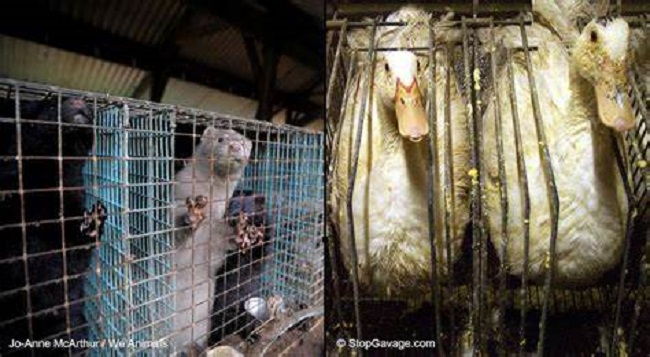The RSPCA is asking the public to pressure their MPs to stop the Government u-turning on its promise to ban the import of cruelly-produced foie gras and fur.
Despite the production of foie gras and fur being illegal in the UK due to the suffering involved, it is still legal to import these goods.
This was set to change with an import ban proposed in the Animals Abroad Bill, but latest reports indicate that the Government has changed its mind.
RSPCA Head of Public Affairs David Bowles said: “We are alarmed about reports that the Government is changing its mind on banning imports of fur and foie gras. Both these practices cause suffering to animals and, by allowing them to be imported here, the UK is complicit in these cruel trades. This is a huge step backwards for animal welfare.
“Farming and trapping wild animals for fur can be a cruel and unnecessary business that should have no place in the modern world. Even though fur is no longer farmed in the UK, it is still legal to import and sell it here.
“The public’s revulsion is clear; 95% of people declare that they would never wear real fur and there have been over 1 million signatures on the #FurFreeBritain petition. But the UK remains complicit in the continuation of the global fur market, profiting from this cruel international trade. It is shameful and it’s high time we got our house in order and made fur imports and sales illegal.
“Traditional foie gras is made from the livers of ducks or geese that have been force-fed, a practice considered cruel by the RSPCA and leading animal welfare scientists, and our laws effectively already prohibit it from being produced here due to the suffering involved. But more than 150 tonnes are still imported from mainland Europe each year and make their way into our supermarkets, restaurants and delicatessens.
“If the method of making a product causes so much animal suffering that producing it here would breach animal welfare law, then surely importing that product from another country should be illegal too.
“The Government should stop outsourcing cruelty, stand by its commitment to maintain and improve animal welfare standards, and ban the import of fur and foie gras once and for all. In the meantime, everyone can help to reduce the trade - and the impact on welfare - by committing not to purchase fur or foie gras.”











